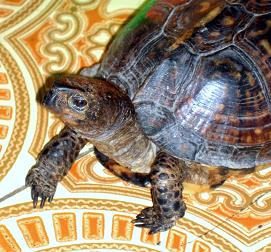|
|
The Goldilocks
Syndrome
Definition: An extreme sense of entitlement. Expectation of Manna falling from heaven without acknowledgment or gratitude. Named for the ungrateful character in Goldilocks and the Three Bears. Twenty years ago, when my three year old daughter christened our tortoise Goldilocks, I always thought it was a very odd name for a beast with no visible hair on her gnarly body, blonde or not. Twenty years on, her appellation seems highly appropriate after all. I failed to see that Goldilocks shares her namesake’s sense of entitlement. When the ‘real’ Goldilocks comes upon the cottage in the woods, she helps herself to whatever she finds. Not content to merely enjoy the amenities, she has the pluck to be fussy about everything she finds: one bed is too hard, one is too soft. As if everything exists for her pleasure, she never considers who it belongs to, that she might be imposing, doesn’t feel remorse after eating their porridge or breaking their furniture or feel the least bit grateful. Perhaps Goldilocks and the Three Bears can be seen as a way of teaching children how to be a better guest. When Goldilocks (the turtle) is hungry, she rouses herself from the box where she sleeps and clatters into the kitchen. Especially when she detects cooking smells, she cranes her neck expectantly. More often than not, a chunk of curried beef, a raw shrimp (shelled and cut up) or a piece of mango drops in front of her. She eats (imagine a steam shovel tearing away at a piece of meat the size of a car), she defecates, and then returns to her box. To me, it feels like she has an expectation that tasty snacks fall from the sky when she is hungry…and she’s usually right. Any acknowledgement (apart from emptying her bowels), appreciation or gratitude is not part of this equation. I chuckled at my turtle’s apparent sense of entitlement. I told my friends about her but then I began to notice that her attitude isn’t that unique. My teenage children appear when they are hungry, snacks materialize in front of them, they eat, and they leave, all with a disturbing lack of appreciation or gratitude. Could it be contagious? Is there something I’m doing wrong? I have since dubbed this extreme form of entitlement, the Goldilocks Syndrome. I notice it at work and in many aspects of my life. I see it in beggars, princes’ and princesses, in General Motors and in those who expect something for nothing. My teenagers will grow out of it as they mature and learn that stuff doesn’t just fall from the sky. Like many of us, they become more grateful and appreciative as they learn how to fend for themselves. As for Goldilocks, there isn’t much I can do but toss her a chunk of mango once in a while and hope that food appears when she needs it.
This article copyright © Bradley Foster, 2010
Bradley Foster is a Gestalt-trained life and leadership coach who lives in Toronto and practices across North America. He can be reached at bfoster@giantstepscoaching.com, and www.giantstepscoaching.com . Learn about coaching with Bradley here.
|
|

